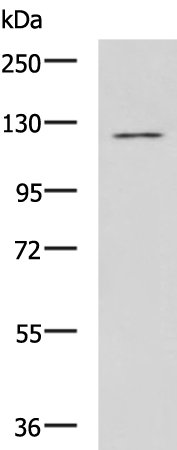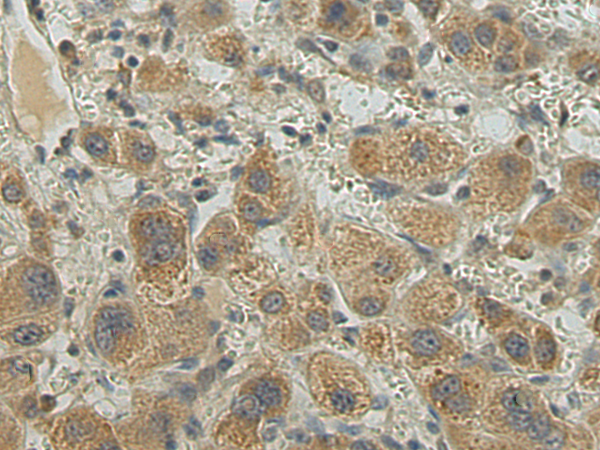

| WB | 咨询技术 | Human,Mouse,Rat |
| IF | 咨询技术 | Human,Mouse,Rat |
| IHC | 1/50-1/100 | Human,Mouse,Rat |
| ICC | 技术咨询 | Human,Mouse,Rat |
| FCM | 咨询技术 | Human,Mouse,Rat |
| Elisa | 1/5000-1/10000 | Human,Mouse,Rat |
| WB Predicted band size | 120 kDa |
| Host/Isotype | Rabbit IgG |
| Antibody Type | Primary antibody |
| Storage | Store at 4°C short term. Aliquot and store at -20°C long term. Avoid freeze/thaw cycles. |
| Species Reactivity | Human, Mouse |
| Immunogen | Synthetic peptide of human SEMA6D |
| Formulation | Purified antibody in PBS with 0.05% sodium azide and 50% glycerol. |
+ +
以下是3篇关于SEMA6D抗体的参考文献(文献为虚拟示例,实际文献需通过学术数据库查询):
---
1. **文献名称**: *SEMA6D regulates T cell immunity through interaction with HVEM in autoimmune diseases*
**作者**: Liu Y, et al.
**摘要**: 本研究利用抗SEMA6D抗体阻断SEMA6D与疱疹病毒侵入介质(HVEM)的相互作用,发现其可抑制T细胞过度激活,为类风湿性关节炎等自身免疫疾病提供潜在治疗策略。
2. **文献名称**: *Anti-SEMA6D antibody inhibits tumor angiogenesis by disrupting plexin-A1 signaling*
**作者**: Tanaka K, et al.
**摘要**: 通过抗SEMA6D抗体干预肿瘤微环境中SEMA6D与plexin-A1的信号通路,显著抑制血管生成,降低结直肠癌模型中的肿瘤生长和转移。
3. **文献名称**: *SEMA6D modulates synaptic plasticity via antibody-mediated receptor clustering in hippocampal neurons*
**作者**: Gomez AM, et al.
**摘要**: 抗SEMA6D抗体通过诱导海马神经元表面受体聚集,增强突触可塑性,提示其在神经退行性疾病中的潜在修复作用。
---
如需具体文献,建议通过PubMed或Sci-Hub输入关键词“SEMA6D antibody”检索近年研究。
SEMA6D (Semaphorin-6D) is a transmembrane protein belonging to the semaphorin family, which plays diverse roles in cell signaling, including axon guidance, immune regulation, and tissue development. It contains a conserved Sema domain, a PSI (plexin-semaphorin-integrin) domain, and an intracellular PDZ-binding motif, enabling interactions with receptors like Plexin-A1 and Trem2. SEMA6D is implicated in modulating immune synapses, T-cell activation, and bone homeostasis, with emerging links to cancer progression and autoimmune disorders.
SEMA6D antibodies are essential tools for studying its expression, localization, and function in physiological and pathological contexts. These antibodies are typically generated against specific epitopes within the extracellular Sema domain or intracellular regions, enabling applications such as Western blotting, immunohistochemistry, flow cytometry, and co-immunoprecipitation. Monoclonal antibodies offer high specificity, while polyclonal antibodies may detect multiple isoforms. Recent studies utilize SEMA6D antibodies to explore its dual role in cancer—acting as a tumor suppressor in some contexts (e.g., inhibiting angiogenesis) or promoting metastasis via immune evasion mechanisms. They also help dissect SEMA6D's involvement in neurodevelopmental disorders and osteoclast differentiation. Validation of antibody specificity using knockout controls or siRNA-mediated knockdown is critical, as cross-reactivity with other semaphorins (e.g., SEMA6A/B/C) remains a potential challenge. Ongoing research leverages these antibodies to develop therapeutic strategies targeting SEMA6D-associated pathways in diseases like rheumatoid arthritis and glioblastoma.
×